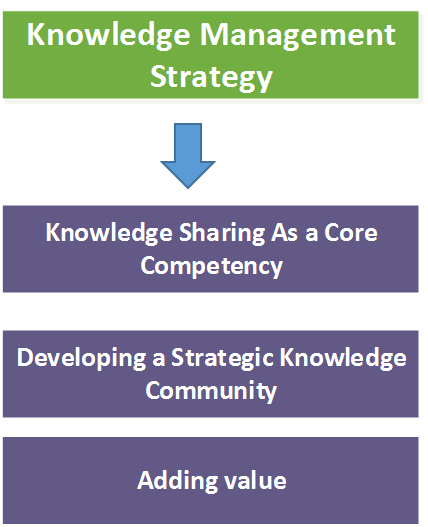Knowledge management can be seen as a strategic activity. A close association between the organisational strategic plan and knowledge management make sure that the knowledge activities have a proper contribution in the profitability and strategic advantage of the organisation. In order to attain the better market position, an organisation should avoid duplication of efforts and promote innovation. Change is the main aspect of any work environment. When the employees enter in the workplace, there is a certain skill set, characteristics and knowledge possessed by employees which is obtained with the help of education and experience. On the other hand, in a new work environment, some additional learning opportunities are provided by the organisational culture, peers and work experiences. With the help of these developmental activities, it can be ensured that the fundamental competencies of the manpower match with the created work environment where they have to perform. It also acts as a basis of imponant conducts which are significant for achieving the key business results. The entire organisation must be equipped with the capacity development for the development of the long-term capabilities. This makes sure that the required capabilities and competencies are created by the employees so that they are able to fulfil the future challenges and requirements. Over a period of time, various organisational directions will evolve that will require some new and varied skill in the employees. This will be further assisted by the intuitive and flexible leader who will evaluate the external environment, monitor the changing trends and try to come up with the best processes to implement the required changes. With the help of capacity development, the knowledge workers are motivated to predict and get ready for the long-term organisational strategic requirements. Therefore, it indicates the capacity to reflect, affect, execute and regularly change With the new inputs and effects. This is the main organisational competency that has to be promoted in the knowledge environment and must be obvious in those who are looking to form the knowledge management activities.

Knowledge Sharing As a Core Competency
The process which is used to exchange the knowledge (i.e., skills, capabilities or information) among different individual, employees of any firm, family member, community or organisational member is termed as knowledge sharing. The knowledge management systems commonly help the knowledge sharing processes. In fact, there are many factors apart from the technology that affects the knowledge sharing process in the organisation such as, organisational culture, incentives and trust. A major challenge is formed by the knowledge sharing in the knowledge management area because some of the employees are not ready to share their knowledge with whole organisation. While talking about knowledge management, a number of core competencies are enlisted by many writers which can be inculcated among the manpower. In the opinion of Fuchs core competencies can be seen as those characteristics which are particularly promoted within the organisation and are difficult to produce outside. In fact. due attention must be given to the identification of core competencies. The organisational capabilities can be harmed if the focus remains on those capabilities which are easy to replace or degrade. Knowledge sharing is one of the core competencies. Most of the employees will go through the opposing messages related to the sharing requirements especially when the incentives are given to the individual employee rather than the entire group. Work setups can only have verbal support to the sharing but only a limited change or motivation will be provided to do so. Sharing and teamwork should be promoted by the knowledge-intensive communities. The individuals should share proactively, have a discussion on the processes and observe their leader sharing and modeling their knowledge.
Developing a Strategic Knowledge Community
Developing a strategic knowledge community is the main objective of knowledge management. The importance is given to the common knowledge sharing and creating better practices with the help of community interaction. During the development of knowledge management principle, one must address the requirement to combine the community in place of some selected ones. It influences the manner in which the social and physical infrastructures are developed and the way reflection of leadership takes place throughout the organisation. Promoting the knowledge diffusion is the important part of this activity. Most of the managers are regional and they look to have better control over the intellectual material, its sharing and access. The knowledge environment should be user-focused rather than being system-focused so that the stakeholder can easily recognise and access the different sources of knowledge. The nature of power and control in the knowledge environment is altered by this. When the focus is transferred from unit-based protectionism to the collective good, there may be a need of strong leadership. There will be a requirement of restructuring the expectation and responsibilities within the work set-up and the need of sharing of knowledge is further strengthened in order to take the form of a core competency.
Adding value
Knowledge management should result in the value addition is the ultimate principle. There is a good possibility in the knowledge management to become a major organisational factor that can contribute the important value in the long term. In fact, the manner in which the organisation treats its employee, its system and the way they interact is also needed to be changed. It is important to evaluate any activity associated with the knowledge management in order to make sure the value addition. Effective knowledge management may be seized rather than being promoted, if the practices of other organisations are copied without any questioning or adopting the theoretical models rigidly without giving any considerations to the prevailing culture. Thus, it is important to have cautious consideration and regular evaluation of the knowledge management development so that the positive contribution of all the elements can be ensured towards the regular execution of an effective knowledge culture and associated practice which are important for the organisation.